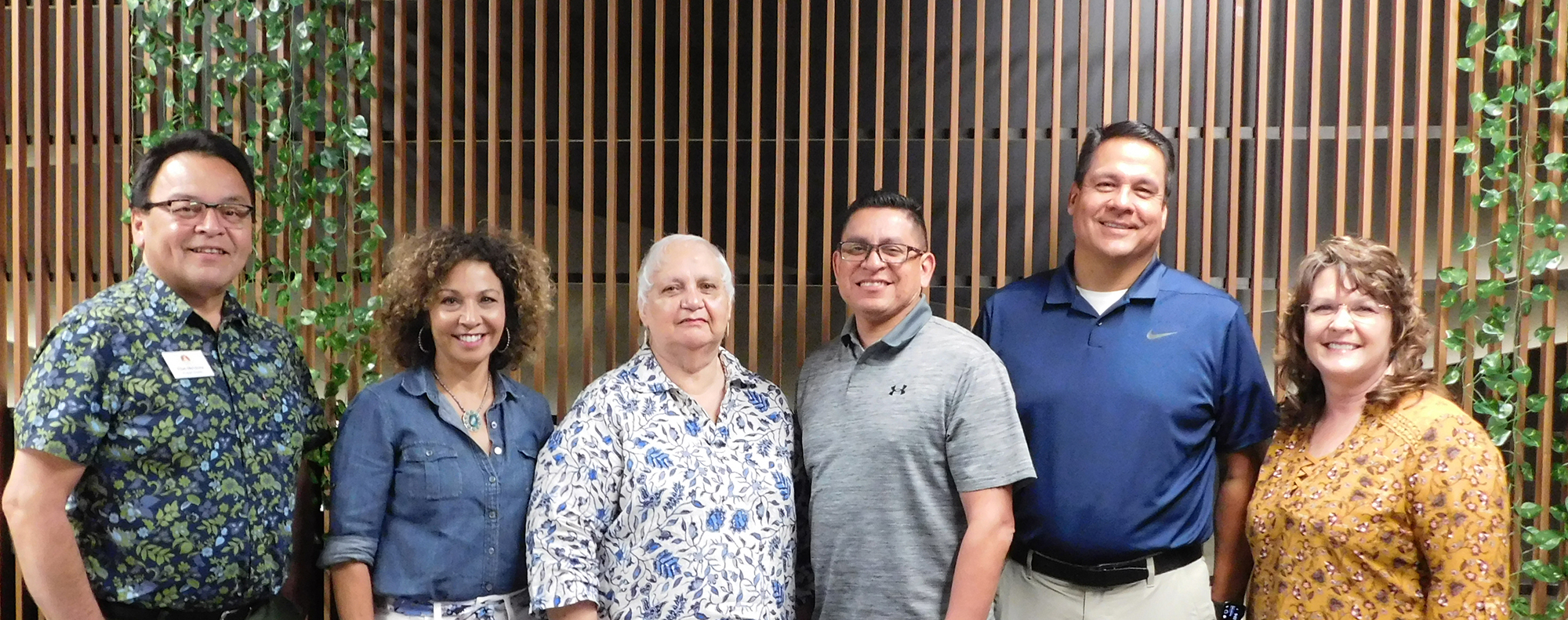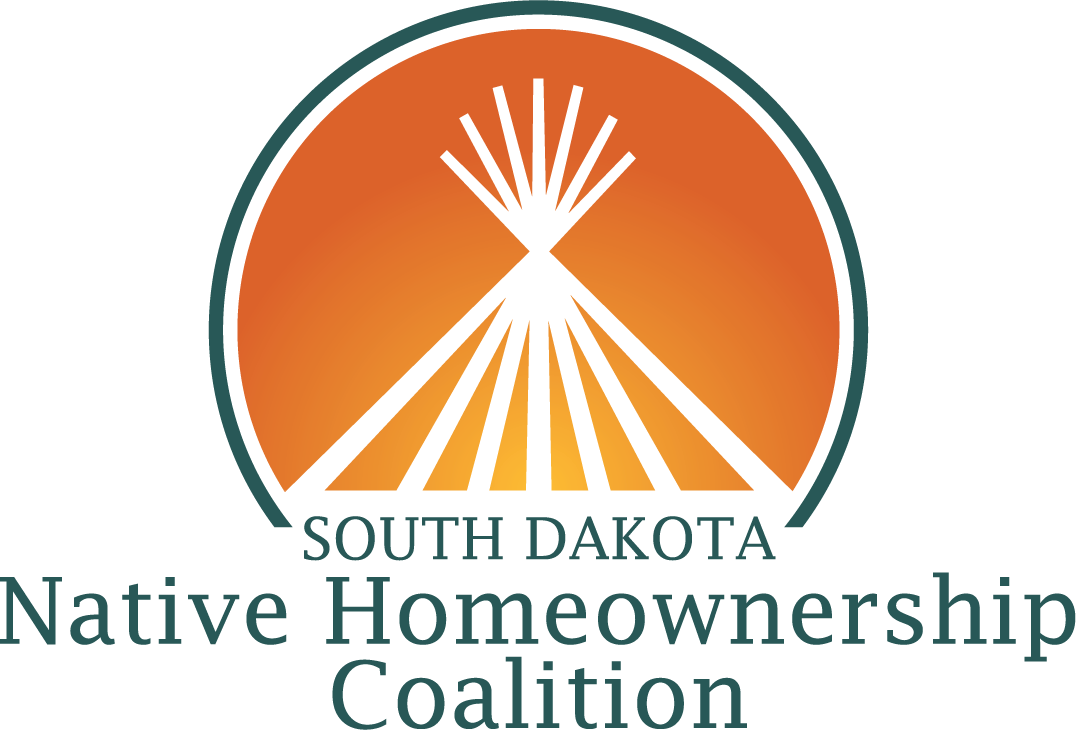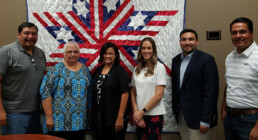Getting to Know Sharon Vogel
Sharon Vogel, Chairwoman

Sharon Vogel (third from left) was seated on the South Dakota Native Homeownership Coalition’s inaugural Board of Directors in June 2022. She serves as the Chairwoman and is the Executive Director of Cheyenne River Housing Authority.
A New Era of Indian Housing
The Native American Housing and Self-Determination Act (NAHASDA), which was enacted by Congress in 1996, transformed housing in Indian Country by giving tribes greater control over their allocations of federal dollars. It was shortly after this game-changing legislation that Sharon Vogel, with encouragement from her mentor, returned home to the Cheyenne River Sioux Reservation to enter into the homeownership field. Taking on a totally new initiative that had no established road maps, Sharon helped launch the Cheyenne River Housing Authority’s One Stop Mortgage Center. The center was part of a national strategy to build local capacity and promote homeownership in Native American communities.
“We realized it wasn’t going to be a cookie cutter program,” says Sharon, reflecting on the novelty of mortgages on the Reservation over 20 years ago. “That first year we closed maybe three loans, and each of them was a process. You had never done it before, and they had never done it before.”
Those were some of the first Housing and Urban Development Section 184 (HUD 184) mortgages deployed on Cheyenne River, but there were more “firsts” to come. Realizing they needed capital from a community-based mortgage lender, Sharon was an integral part of creating Community 1st Credit Union in 2007 under the sponsorship of the Cheyenne River Housing Authority. Although it has become part of Black Hills Federal Credit Union, the facility continues to provide essential banking services to Cheyenne River residents.
Setting the Foundation with Education
Just having more ready access to mortgage capital ushered in a new era of progress, however, Cheyenne River Housing Authority’s 12-week homebuyer education program has also brought about transformational change. Although the class itself has changed and grown over the years, Sharon believes it is still the best thing they can do.
She explains, “The classes have been great for introducing the mortgage loan process and they also incorporate consumer education. It has been really impactful and has practical applications to all aspects of life. The feedback is always positive, and that’s how we know we’re on the right path.”
Sharon says the participants that have completed the class and gone through the mortgage process have been some of the best advertisers of homeownership. Cheyenne River’s local Native community development financial institution (CDFI), Four Bands Community Fund, has also been a major contributor to increasing the number of homeowners on the Reservation. Potential homebuyers now have multiple lender options for financing their new home.
“Mortgage lending is now really understood [in the community],” says Sharon.
Another major milestone achieved under Sharon’s leadership has been the successful financing of seven housing development projects for Badger Park, a 160-acre development that will eventually house up to 1,500 people. With 38 planned homeownership lots, the development will also feature apartments, rentals, elderly housing, and outdoor recreational areas.
“One of our biggest accomplishments is to be able to provide the mortgage borrower with a tribal lot assignment that has fully-built infrastructure,” says Sharon. This approach eliminates prohibitive infrastructure costs that many families would have otherwise faced building in a rural area.
Implementing Collective Action Strategies
Sharon has been involved with the South Dakota Native Homeownership Coalition from the start and was immediately drawn to the Policy Committee, which she has co-chaired for the past six years. She saw that many of the barriers to homeownership would require coordinated advocacy as part of the solutions, so that is where she has applied much of her energy.
“It is so satisfying to see more things happening, especially since the Coalition started. We’ve seen homeownership rates increasing on all of the reservations,” delights Sharon.
The Coalition’s Policy Committee has raised awareness of Native American homeownership by engaging policy makers and helped spread replicable models throughout the country by leveraging partnerships. They have also celebrated several policy victories, especially with the Veterans Affairs Native American Direct Loan (NADL) program and the USDA 502 Direct Loan program. Although these are some big wins, Sharon points out that the Coalition’s advocacy work really took hold as more partners joined in the earlier years. It was a collective effort that effected change.
She adds, “You can’t underestimate the value of small change. I think about some of the small steps leading up to where we were able influence the development of important work. There is so much work that has been impactful, yet there is so much more work that needs to be done. We are very fortunate to have multiple successes in multiple arenas, and that is the result of very hard work.”
A House is More Than a Home
Outside of work, Sharon enjoys spending time with her kids and grandkids. A big part of her enjoyment is being supportive and encouraging them in their activities. She also appreciates being able to go home and unwind with leisurely projects.
“Your home is your sanctuary and your retreat,” she comments.
Centered on that belief, it is no coincidence that Sharon continuously works to create a similar reality for so many other Native families in her community, across the state, and throughout the nation.
“You see what families can do when they are stabilized. It changes the family in a good way. It changes their children and grandchildren, and it changes the whole community. It’s important for people to know they have a safe place,” affirms Sharon.

